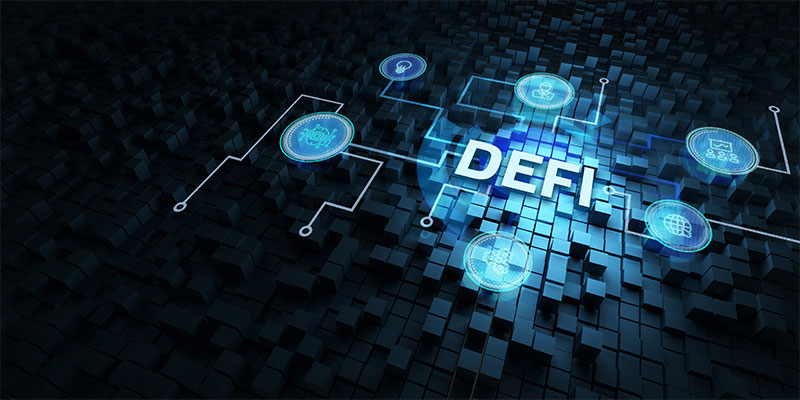Hey, Justin here. Today I’d like to hand things off to Chief Analyst Stephen McBride to talk about decentralized finance (DeFi). It’s a new financial world being built on the blockchain.
Now, some of you may be familiar with DeFi already, but I doubt you’ve heard it explained like this before. The following essay is from our October Disruption Trader issue, but it’s still incredibly relevant and informative.
***
Middlemen rule traditional finance. Loan officers at banks decide whether to give you money. We have to deal with stockbrokers, mortgage brokers, and insurance brokers.
DeFi is banking without the bankers. It’s a whole new financial system built on Ethereum’s (ETH) blockchain.
Blockchain’s key innovation is automating trust between strangers. This is extremely powerful. It means we no longer have to rely on financial middlemen to buy stocks or lend money.
DeFi replaces bankers with software. This software is built and managed by a community of individuals on the blockchain, spread across the world.
In other words, DeFi is creating a new financial system. And the rails of this new financial system aren’t owned by middlemen but by a network of distributed computers. Best of all, software developers and crypto holders earn the fees that bankers used to earn.
Take Uniswap’s exchange, for example.
Uniswap collects a 0.3% fee each time someone buys or sells crypto on its exchange. These fees don’t go toward paying for a broker’s new Ferrari. They go to Uniswap users.
Let me show you how Uniswap works…
Like the New York Stock Exchange, Uniswap needs “liquidity.” In other words, it has to attract lots of buyers and sellers to its platform so they can trade easily.
Uniswap achieves this by creating “pools” of various cryptos that traders can tap into. Uniswap.org doesn’t supply these crypto assets itself. They come from individual users.
Anyone can buy cryptos and put them in a Uniswap pool. For doing so, you earn a portion of the fees generated from that pool. For example, if you own 20% of the assets in a pool, you’d earn 20% of all fees paid by traders.
It’s the little guys who “win” in DeFi. Not fat-cat bankers. Is it any wonder decentralized exchanges (DEXs) like Uniswap have achieved mind-boggling growth?
Last quarter, $405 billion flowed through DEXs. That’s a 117X surge in just one year.
The vast majority of investors have never heard of DeFi.
Less than three million people have ever used a DeFi app. In other words, you are one of the first people in the world to know about this opportunity.
Just 18 months ago, DeFi was a small $2 billion market. Today it’s worth over $120 billion. A decade from now, it will be a multitrillion-dollar industry.
How can I be so sure?
DeFi has quickly become the world’s best testing ground for ideas. The place where entrepreneurs can launch businesses in a flash.
Uniswap is the perfect example. It was created by a kid who wrote code in his parent’s basement. Within a year, he created a $12 billion Wall Street replica on the internet. In the past, this would have taken billions of dollars and an army of employees to pull off.
In short, DeFi has slashed the cost of implementing world-changing ideas. We will see some of the best businesses in history come out of this space in the coming years.
DeFi is already superior to dealing with banks in almost every way.
Banks are open 9–5. DeFi runs 24/7.
Wire transfers and stock trades can take days to “settle.” DeFi transactions are near-instant.
By reinventing finance from the ground up, DeFi is finishing what “fintech” companies started.
PayPal (PYPL), Square (SQ), and other fintech companies have attracted hundreds of millions of users. Their stocks have showered shareholders with incredible wealth. And to be clear, I think they’ll continue to do extremely well.
But they can never match DeFi because fintech is built on the “old” financial system. For example, Venmo and CashApp still require you to link a debit card or bank account to send funds. Robinhood (HOOD) runs on clearinghouse infrastructure that was built in 1973.
DeFi eliminates every part of the old financial system. That’s why it’s one of the biggest disruptions in history. It’s going to eat traditional finance and change the money business forever. And we have the chance to make life-changing gains as this shift plays out.
The era of decentralized finance is just getting started. Buckle up, my friend.
Stephen McBride
Editor — Disruption Investor




